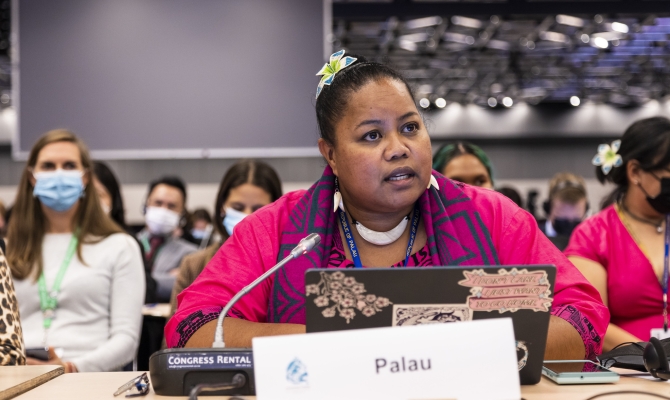
08 December 2022, Montreal, Canada - Palau raised its mighty voice, representing the Asia-Pacific region with over 20 island developing nations, at the 15th Conference of the Parties to the Convention on Biological Diversity in Montreal, Canada.
Taking the floor on behalf of the Asia-Pacific region and addressing over 190 countries as well as partner agencies and observers, Palau called for support to tackle all the challenges faced in the work to halt biodiversity loss, to ensure the effective implementation of the Global Biodiversity Framework.
The CBD COP15 now underway brings together more than 190 Parties to agree upon a new global biodiversity framework that will see the world working together to achieve 22 Targets to halt biodiversity loss and address the impacts brought about by the current rate of biodiversity loss to help achieve the world vision of “Living in harmony with nature” by 2050.
Resourcing is a key priority needed by the Asia Pacific Group to ensure the effective implementation of the new Global Biodiversity Framework when it is adopted.
“We strongly emphasise the need for adequate resource mobilisation. Our region welcomes the funding for the implementation of the Global Biodiversity Fund, including the Kunming Biodiversity Fund, Japan Biodiversity Fund and the financial resources committed by the Government of Canada. We also urge Parties to provide adequate, effective, transparent and predictable financial support,” said Ms Gwen Sisior of the Palau delegation, on behalf of the Asia Pacific Group.
“We note that early revisions of National Biodiversity Strategic Action Plans with estimations of necessary resources, innovative finance to accelerate resource mobilisation, and effective utilisation of funds and other approaches were identified in a webinar hosted by Japan as important actions for implementation.”
The Asia-Pacific Region is home to communities and ecosystems with unique vulnerabilities when it comes to biodiversity loss. The Intergovernmental Science-Policy Platform on Biodiversity and Ecosystem Services (IPBES) has outlined five key drivers of biodiversity loss: changing use of sea and land, direct exploitation of organisms, climate change, pollution and invasive non-native species.
For the Asia Pacific Region this is of great concern as invasive alien species have increased in number and abundance representing one of the most serious drivers of biodiversity loss across the region. Populations of large wild mammals and birds have declined across the region due to the degradation of habitats, especially forests and grasslands.
“Half of our region is ocean; the Pacific Ocean holds a wealth of biodiversity and provides vital ecosystem services to innumerable people, and we need sufficient time for discussions of ocean issues. This includes Target 3, which aims to achieve adequate conservation and/or protection of biodiversity resources that are needed for terrestrial, island, coastal and marine ecosystems,” stated Ms Sisor on behalf of the Asia Pacific Region.
“Relatedly, our work here and the work of the UN Framework Convention on Climate Change must be mutually reinforcing. We should work towards a GBF which minimises the impacts of climate change on biodiversity and ensures mitigation and adaptation efforts avoid negative impacts on biodiversity.”
Recognising the number of island-developing states within the Asia-Pacific region, the group also made it clear their call for increased recognition of Small Island Developing States within the Convention on Biological Diversity.
“The Preamble to the CBD Convention explicitly acknowledges the special conditions of Small Island Developing States. Hence there are special needs for capacity development and resourcing. We note the work undertaken by the Secretariat on the programme of work on island biodiversity, however, we emphasise the need to directly address the means of implementation of the above-mentioned work, and to consider the unique characteristics and vulnerabilities of SIDS.”
“The Asia Pacific has most of the world’s population with countries ranging from large land masses to the smallest, from landlocked to big ocean states and therefore we have many divergent views and perspectives, but as a region, we believe that this Global Biodiversity Framework is an important strategy that can set the world on the path to ensuring its survival and are committed to working with other regions to shape the future of global biodiversity in the next couple of weeks. Finally, we hope for fruitful deliberations and discussions, and a successful second part of the 15th Conference of the Parties.”
The statement was made at the CBD COP15 on 7 December 2022.
The Fifteenth Conference of the Parties to the UN Convention on Biological Diversity (CBD COP15) is held in Montreal, Canada from 7 – 19 December 2022. Chaired by the Government of China, the CBD COP15 will result in a new Global Biodiversity Framework that will continue the 2020 Biodiversity Targets with the global goal of halting biodiversity loss.
Fourteen Pacific Islands countries are Party to the CBD. They are contributing to a unified One Pacific Voice on collective issues at COP15. The countries present in Montreal are the Cook Islands, Federated States of Micronesia, Fiji, Kiribati, Niue, Nauru, Palau, Papua New Guinea, Republic of the Marshall Islands, Samoa, Solomon Islands, Tonga, Tuvalu and Vanuatu.
Led by the Secretariat of the Pacific Regional Environment Programme (SPREP), support to Pacific island countries has been implemented with technical input through the Pacific Islands Roundtable for Nature Conservation (PIRT), and includes a One Pacific approach involving support from the Office of the Pacific Ocean Commissioner, and the Pacific Community at COP15 with financial assistance from the Government of Australia and the ACP MEA Phase 3 Project funded by the European Union and the Organisation of African, Caribbean and Pacific States for the ACP countries.
For more information on the CBD COP15 please visit: https://www.cbd.int/conferences/2021-2022 or email [email protected].
Photo: UN Biodiversity Album Flickr